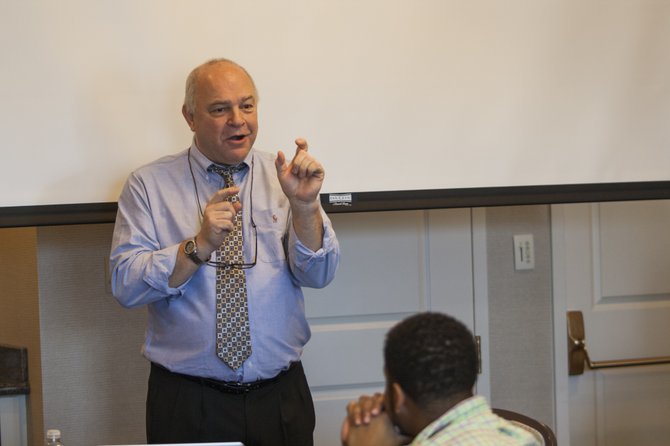Steve Jarding told students and community leaders that leadership means leaving more behind in this world than you take out of it. Photo by Jacob Fuller.
Harvard professor and political consultant Steve Jarding capped off last week's Mississippi Black Leadership Summit by telling a small group of students and community leaders what he believes it takes to be a leader.
"Leadership isn't getting elected. Leadership is performing. You've got to change your world. You've got to leave a better society. You've got to leave more than you took away or, to me, that's not leadership," Jarding told the audience of about two dozen at the Hilton Garden Inn.
The session with Jarding, which coincided with a meeting of the state's Legislative Black Caucus across the hall, finalized a three-day summit held by One Voice, a statewide policy think tank, and the state NAACP at the Jackson Convention Complex and the Hilton Garden Inn.
The summit brought in African American leaders from around the nation to discuss topics including community improvement, urban development, education, local government, civil rights, encouraging entrepreneurship and minority-owned business.
The message of Jarding's speech was leadership, though. While Jarding said leadership and public office don't always, or even often, go hand-in-hand, he framed much of his message in his area of expertise: politics.
Jarding said he received his view on leadership from his mother, who raised eight children in rural South Dakota on her own after Jarding's father died when he was 4 months old. On her deathbed, she told him her legacy was raising eight children and sending all of them to get quality educations.
"On the last day that you live and breathe, the last day that you breathe air on this Earth, please do not look back, as you lay your head on that pillow, and say, 'I did not leave more on this Earth than I took away,'" Jarding said his mother told him.
Giving, and not just taking away, was also the message of two of the summit's early speakers. Yorman Nunez is the field organizer for the Massachusetts Institute of Technology's Community Innovators Lab, aka MIT CoLab. He told black leaders during the day's final session at the Jackson Convention Complex Nov. 28 about a neighborhood in the Bronx that sees a lot of money pass through, but rarely sees it stay in the ZIP code. It is home to New York City's third-largest economic corridor and Hunt's Point Cooperative Market, the world's largest food distribution center. Despite the money passing through the 10474 ZIP code, it remains an impoverished and largely malnourished area of New York City that does not contain a single supermarket.
"Chances are, even though you'll be obese or living on the food desert with no access to healthy food, or little access to healthy food, you'll be within in two miles, a mile, from the Hunt's Point food market, the world's largest food distribution center," Nunez told the audience at the Jackson Convention Complex. "We distribute food to 48 states and 55 foreign countries. So there is a real design problem here."
Nunez said the lack of supermarkets is just one of many examples of how the Bronx is great at creating wealth, but nearly all of it leaves the borough.
The community asked MIT CoLab to help citizens find their voice when developers and government officials discuss future plans. MIT CoLab showed its ability to lead when it won what Nunez called "a 15-year fight" against plans to build a shopping mall at the former site of a military armory in the neighborhood.
The mall would only bring low-wage jobs to the borough, which wouldn't help lift any of the citizens out of poverty, Nunez said. Community organizers fought the mall's developers and won; the former armory site still sits vacant.
Nunez and CoLab Program Manager Nick Iuviene said that after the mall fight, they realized they had to change the way they approached community development and leadership. Their actions were keeping community organizations at odds with developers--and government leaders--instead of bringing them together.
The answer, Nunez said, is not to take a needs-based approach in which citizens ask developers to build what they need. Instead, citizens and community leaders need to learn to leverage what they have. Taking a systemic approach will make developers desire what the neighborhood already has to offer.
Nunez said CoLab is still trying to figure out how to implement that systemic approach in the Bronx. Jackson is a far different situation, so Nunez did not have specific answers for how the approach could work here. Nonetheless, the approach of finding what a neighborhood has to offer a developer, and leveraging that offer, could be a key starting point for progress in the capital city.


